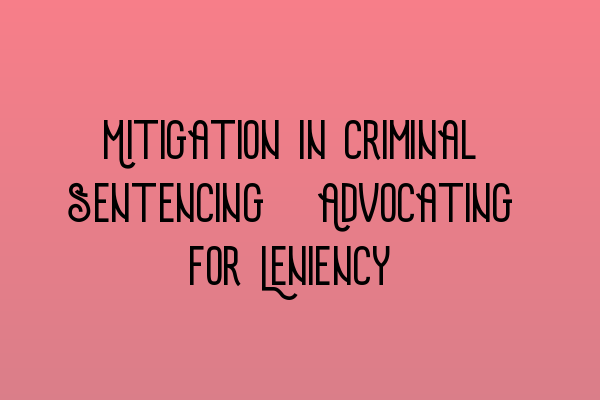Mitigation in Criminal Sentencing: Advocating for Leniency
When it comes to criminal sentencing, advocating for leniency through effective mitigation can play a crucial role in securing a favorable outcome for your client. In this blog post, we will explore the importance of mitigation in criminal sentencing and discuss some key strategies that criminal lawyers can employ to advocate for leniency.
Understanding Mitigation
Before delving into the strategies, it is important to understand what mitigation entails in the context of criminal sentencing. Mitigation refers to the presentation of facts, circumstances, and evidence that can potentially reduce the severity of a sentence. It aims to convince the court that there are mitigating factors that warrant leniency in the sentencing decision.
One key aspect of effective mitigation is addressing the personal circumstances of the defendant. This may include factors such as age, mental health, and family background, which can provide insight into the defendant’s character and potential for rehabilitation. By highlighting these factors, a skilled criminal lawyer can humanize their client and create a more sympathetic image in the eyes of the court.
Developing Persuasive Mitigation Strategies
Advocating for leniency requires careful planning and execution. Here are some strategies that can be employed:
1. Gathering Strong Evidence
Securing tangible evidence that supports the mitigation case is essential. This may involve collecting documents, expert opinions, or witness statements that can attest to the defendant’s positive attributes or the unique circumstances surrounding the offense. Such evidence can significantly strengthen the argument for leniency.
In addition to documentary evidence, presenting testimonies from individuals who can vouch for the defendant’s character or potential for reform can be highly persuasive. Family members, employers, or community members who can provide positive character references can make a compelling case for leniency.
2. Providing Expert Analysis
Engaging the services of experts who can analyze and present specialized information relevant to the case can be highly effective. For instance, a forensic psychologist can evaluate the defendant’s mental health and provide insights into the potential for rehabilitation. These expert opinions can carry significant weight in convincing the court to consider more lenient sentencing options.
3. Emphasizing Rehabilitation
Highlighting the defendant’s willingness and potential for rehabilitation can be a powerful mitigating factor. Presenting evidence of participation in rehabilitation programs, therapy, or even testimonials from those who have witnessed the defendant’s progress can demonstrate a genuine commitment to change.
It is also beneficial to outline an individualized plan for post-sentencing rehabilitation, such as enrolling in educational programs, seeking employment, or undergoing specific treatment. This shows the court that the defendant is not only remorseful but also actively taking steps to reintegrate into society as a law-abiding citizen.
Conclusion
Advocating for leniency through effective mitigation is an essential part of criminal defense. By understanding the importance of presenting mitigating factors, gathering strong evidence, seeking expert analysis, and emphasizing rehabilitation, criminal lawyers can significantly impact the sentencing decision in favor of their clients.
At SQE Criminal Law & Practice Law UK, we are committed to providing comprehensive education and training to aspiring solicitors. Our SQE 1 Practice Exam Questions and SQE 1 Practice Mocks FLK1 FLK2 resources can help you prepare for the demanding SQE 1 exams. Additionally, our SQE 1 Preparation Courses and SQE 2 Preparation Courses will equip you with the knowledge and skills necessary to succeed in your legal career. Stay informed about upcoming SRA SQE Exam Dates by visiting our website regularly.
If you are looking for expert guidance and training in criminal law, contact SQE Criminal Law & Practice Law UK today. Our team of experienced solicitors can provide you with the tools and knowledge you need to excel in this challenging field.
